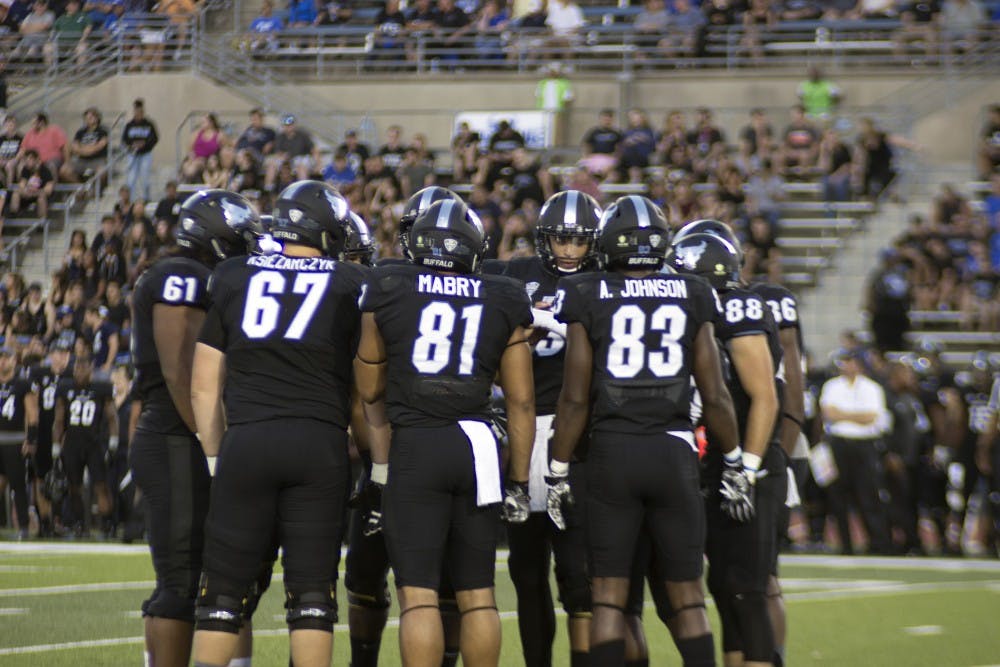A UB football player is suing the university after an administrative panel found him guilty of harassment and possession of a weapon for allegedly pointing an airsoft gun at his teammates on July 6.
The panel suspended the student for two years. The sanctions included the revocation of his free dormitory housing, which was provided as part of his football scholarship.
The student, who does not wish to be identified or speak with The Spectrum, alleges his Fifth Amendment right to due process was violated during the disciplinary process, and that the administrative panel did not follow its own rules of procedure.
The lawsuit is a public document, but The Spectrum is not currently naming the student because he requested privacy.
Joshua Lippes, lead attorney for the student-run nonprofit Sub-Board I, filed a petition in New York State Supreme Court on the student’s behalf on Nov. 3. Lippes asked the court to reverse UB’s decision and issue an injunction against any further action taken against the student without providing him rights to due process.
A court hearing is set for Dec. 18.
Lippes said his client was denied his constitutional right to representation, to provide witnesses, to cross-examine his accuser and was not made aware of his charges in order to prepare a proper defense.
He argued further that the panel did not explain the reasoning behind its decision, and weighed one student’s opinion over other evidence which pointed to his client’s innocence.
At issue is whether or not UB has to follow rules of due process or rules of evidence when it suspends or expels students. The Student-Wide Judiciary’s current bylaws don’t require these laws be followed, but rather consider them a “guide to fair play,” said director of Student Conduct and Advocacy, Elizabeth Lidano, in a previous interview with The Spectrum. Lidano sat at on the administrative panel and declined to comment on this story.
UB officials have argued the Student-Wide Judicial proceedings are not legal proceedings and therefore are not subject to the same due process requirements.
Lippes disagrees.
UB is an extension of the state government as a public, state institution, he said. The consequences of a suspension or expulsion are life-altering, and the process should be subject to the same laws and expectations of fairness as a regular court proceeding, Lippes said.
Lippes’ client was not originally arrested for pointing the airsoft gun, according to court documents attached to the lawsuit.
On July 6, he was riding in the passenger seat of his teammate’s truck, coming back from eating lunch off campus, according to his petition.
University police received a call about a “white male in a red pickup truck” who appeared to be pointing a gun at a group of students. Lippes’ client is African-American. His teammate, who was driving the red pickup truck, is a white male, according to the complaint.
When UPD arrived on the scene, officers arrested the white, male student who fit the description. The student in custody told UPD later that day that he had not touched the gun, but instead his teammate –– Lippes’ client–– had.
Lippes’ client was summoned days later to meet with Lidano and David Wright, senior staff assistant for Campus Living, according to the suit. After questioning the student about the incident several times, the panel made its decision.
On Sep. 13, Mike Hilburger, assistant director of Student Conduct and Advocacy, sent Lippes’ client an email notifying him he had been found responsible and would be suspended from UB for two years, effective immediately.
The student appealed the decision Sept. 27, on the grounds of numerous policy violations, the lawsuit says. His appeal included a statement from a teammate who was present on the day of the alleged incident and said they never saw the student hold the gun.
Lidano responded to the appeal Oct. 20, stating that the decision would not be reversed, but sanctions would be modified.
The student who UPD originally arrested is still at UB and started on the football team this year.
“The only evidence that we were provided, which directly alleges my client was involved in the incident, was the alleged statement of the other UB student originally charged, who told police that my client was the perpetrator,” Lippes said. “We do not know how the administrative hearing or appeals officers weighed this evidence versus the evidence that directly exonerated my client because they did not explain their decisions as required by law.”
Lippes said the panel also included extraneous information in the hearing, which prejudiced the panel’s opinion against his client. This included a photo of a gun, which was not the actual airsoft weapon in question.
“There are so many due process violations in this case … it is difficult to choose just one as the determinative factor,” Lippes said.
In September, students from UB’s Civil Liberties Union asked President Satish Tripathi to allow students a defender or representative to speak on their behalf during administrative hearings. They argued that students facing consequences as serious as suspension or expulsion could not be expected to adequately speak for themselves.
This is one of the reasons Lippes feels his client was denied a fair hearing. His client tends to be shy and provide very brief answers to questions, he said. Lippes thinks he would have benefited from a lawyer or defender to speak on his behalf.
Sarah Crowley is the senior news editor and can be reached at sarah.crowley@ubspectrum.com





